Rome Total War 2 Empire Divided Too Easy
How can a historical Total War compete with dinosaurs besieging a fortress filled with wraiths and shambling corpses? Ever since the launch of Total War: Warhammer, but even more since the arrival of Warhammer 2, I've been wondering if Creative Assembly has backed itself into a corner. Total War's historical games will undoubtedly continue to appeal to those craving a more grounded strategy romp, but so many of the series' most significant improvements are inextricably linked to a fantasy premise. So where does that leave Total War: Rome 2 - Empire Divided?
Rome 2 is probably not the best showcase of the future of Total War's historical games. It's four years old, not even the latest historical entry, and in terms of both the presentation and the real-time battles, it's a step backwards from Warhammer 2. It was the most popular Total War game before Creative Assembly started dabbling in fantasy, however, so the audience is quite a bit larger than, say, Attila's, which I suspect explains why it's seeing this resurrection.
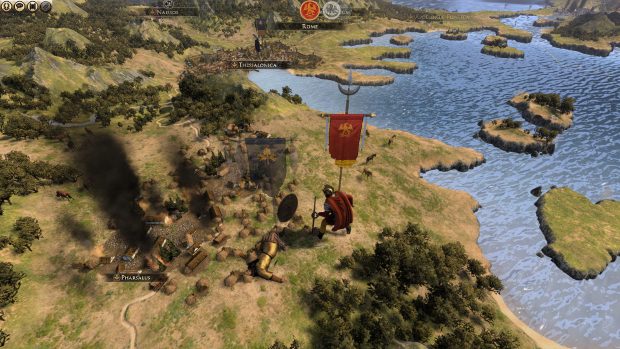
Empire Divided's campaign takes place during the Crisis of the Third Century, which saw the Roman Empire almost destroyed by wars, plague and its separation into competing Roman states. It's pretty fertile ground for a Total War game. The scope is considerably larger than previous expansions, with ten factions - including the three Roman states - and a whole host of mechanics that aren't strictly new for the series, though they are for Rome.
Half of Empire Divided's factions are 'heroic', getting their own unique victory conditions, bespoke event chains and special leaders who can't die in battle. A bit of added flavour, a dash of roleplaying, faction-specific objectives - it all sounds a lot like Warhammer, at least on paper. And there are no better Total War games from which to take inspiration for faction design.
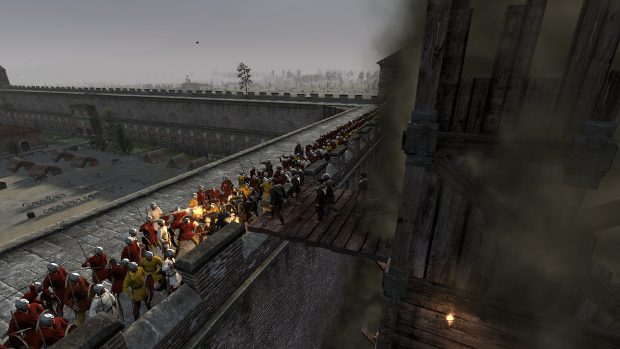
In my first attempt to become Rome's new boss, I played as the Gothi, the only heroic barbarian faction. They're led by Cannabaudes, a veteran of countless battles and campaigns. His story is simply told via a series of narrative windows where he spends his time regaling his warriors with tales of his old adventures. Each of these vignettes allows you to pick how he tells the stories. Did he get his wolf pelt cloak by hunting the beast on his lonesome? Was boozing his one true love? Each choice gives leaders new bonuses, though it's not remotely clear what they are when you select them. And then, abruptly, the story ends. It's a far cry from the scripted battles, hunts for artefacts and quest chains that I've gotten used to during my battles across The Old World over the last couple of Total War games.
Like the rest of the heroic factions, the Gothi get some unique objectives, though they're lamentably just a string of targets - conquer this province, occupy or sack that city - with some flavour text and very few deviations. They do, however, give Empire Divided considerably more direction than plain Rome 2. It's still a sandbox, but it's not quite as messy. Through the wars and invasions that they inspire, the objectives are considerably better at spinning a yarn than the narrative events, too. I couldn't tell you a single thing about Cannabaude's campfire stories, but I can keenly recall my relentless conquest of Greece, and how I held off the Sassanids, Armenians and Parthians with only a stack of brave Germanic warriors and the stalwart walls of Nicomedia.
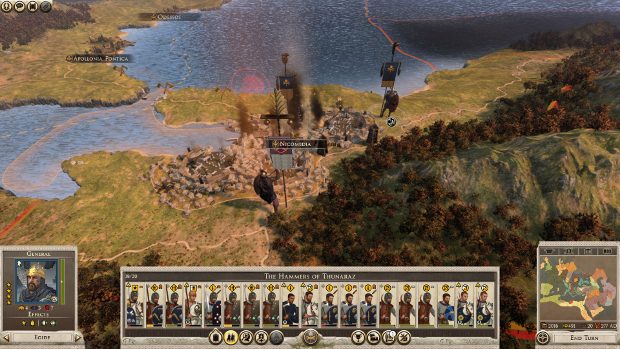
As I sent Cannabaude and the rest of my generals out into the world to loot and conquer, they quickly started levelling up, revealing the new skill trees. They're split up into recruitment, strategy, combat, maritime proficiency and governance, making it easy to create a highly-specialised general. Sure, there's a lot of +1 zeal, +2 authority and the like, but each skill has several ranks, letting them grow with the general. In combination with agent and army skills, you can make some properly beefy fighting forces, but only if you're willing to make some sacrifices elsewhere.
The Gothi start with only a few settlements - a pretty meager empire when compared to some of the competition - so there's not much in the way of empire management early on, but as my borders expanded and more cities were conquered, I started to spend as much time fine-tuning my dominion as I did beating up pesky Romans. Willingly. That's… unusual. The problem with most of the historical Total Wars is that empire management simply doesn't offer interesting choices. Cash flow problems and limited slots necessitate prioritising the construction of specific buildings, but it's always obvious what they should be. Empire Divided makes things less clear-cut.
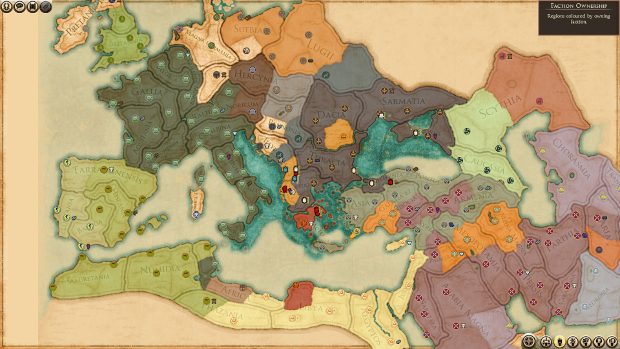
Catastrophe is just around the corner. Like Attila, Empire Divided's campaign has the hint of an apocalypse, with great and old empires colliding and crumbling as plagues grip cities and bandits take advantage of the chaos. The world's falling apart, and it's only going to get worse, so ruling an empire becomes more like desperately applying more glue to keep it all together. That probably sounds awful, but it's the source of some considerable tension and some desperate strategies that combine to make ruling over a burgeoning empire all the more engaging.
New technology trees and building chains have been thrown into the mix to make it possible to avert disaster, or at least slow it down, but concessions have to be made. Food stores, public order and sanitation all need to be maintained, but building something that generates more food often reduces sanitation. The lower the sanitation level of a settlement, the more likely it is to be hit by a plague, stopping it from growing, reducing public order and tanking its income. Worse, plagues can spread to neighbouring settlements via trade and armies.
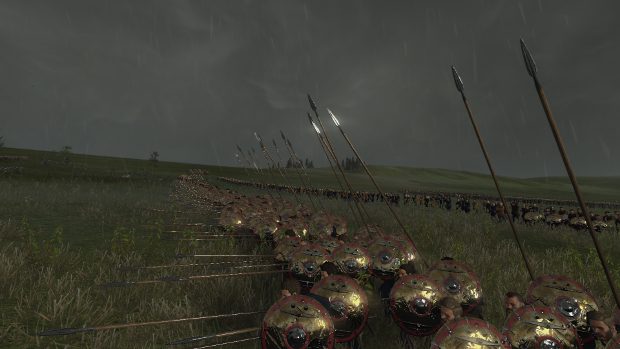
Every province also has a banditry level, which changes depending on buildings, events, armies and generals. The higher it is, the more food levels plummet -- an even bigger problem if you've not constructed many food buildings because you've been worried about sanitation. Bandits get even more eager as empires grow, so even if you've managed to scare all the bandits out of your land, they won't be gone forever. And it's the same for the other obstacles: they never completely go away, and they only get harder to manage.
Then there's the double-edged sword of mystery religions. These enigmatic cults were historically imported by the Romans, drawing in people from all walks of life who wanted to ensure that they had a good afterlife waiting for them. Though they had secret rituals and mystical roots, they were like social clubs. Conservative Romans were sometimes less than enthusiastic about them, fearing the strange influence of foreign mysticism. In Empire Divided, mystery cults can be established for free, giving settlements a set of buffs, depending on the cult. However! Just like the conservative Romans feared, they spread foreign culture, potentially lowering public order. They can't just be torn down when the costs become too high, either, as a special fee has to be paid before the buildings can be destroyed, which increases with every upgrade.
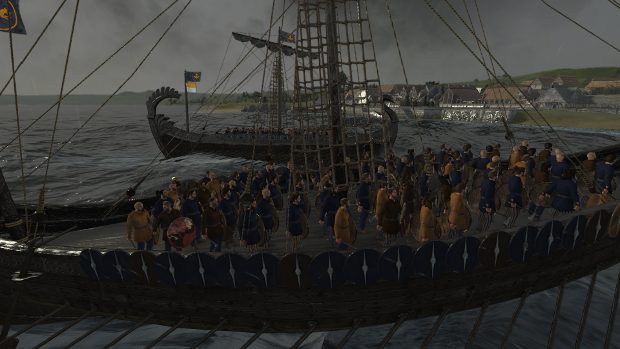
While some of these wrinkles are present in other Total War games, there have never been so many together. It's a new level of complexity for the management layer, and while I think that Warhammer's corruption mechanic might be a bit more elegant, these potential crises present a more rousing challenge. I wasn't immediately convinced, however, as the impact of things like banditry and sanitation aren't nearly as apparent with a small empire.
Unfortunately, a lot of this good is undone by some inconsistent enemy AI. As the Gothi, I barely had any competition until I purposely bit off more than I thought I could chew by declaring war on the entire East. Very, very occasionally I'd see an army doing something mildly clever, but most of them time they failed to lay ambushes, block chokeholds on the campaign map, attack cities that had anything but a small garrison or work together. It wasn't until the late game that my foes stopped being lazy, but by then it was too late for them.

Increasing the difficulty and playing as the Aurelian Roman faction, beset on all sides by enemies, proved to be a bit more challenging. Aurelian's Rome starts off with a fairly large, established empire in Greece and North Africa, with allies and client states all over the place, which effectively allows you to skip a lot of the slow early game. But a large empire also means a much larger list of problems and disasters just waiting to kick off. Within 20 turns, I'd lost a big chunk of North Africa and three settlements up the eastern Adriatic coast. My first objective was to take Rome, but I was far too busy putting out fires all over the map. After a sleepy Gothi campaign, it was exhilarating.
The Aurelian faction was a good opportunity to put the new and improved politics system to good use. With the Gothi, it felt a little thin, but the Romans start off with more internal factions stabbing each other in the back. Large empires tend to have more aggressive political parties, so placating them or destroying them becomes a priority early on. These parties now come with a varying amount of loyalty, which can be influenced by using them in battle and through political events. While they're loyal, they can be put to work on political actions, new and returning, like establishing some order in an unruly province, but disloyal political rivals can spark civil war.

In Rome 2, civil wars normally kick off when you had too few characters in your party. Immediately, everyone not in your party switches to the civil war faction. It's a nightmare. With the new system, political parties are attached to specific provinces, the number of which is based on their influence level. If they rebel, everyone doesn't automatically join them, and the only provinces that succeed are the ones under their control. Not only is it less severe and arbitrary, it's a lot clearer when problems are brewing, making it more likely that you'll be able to stave off a civil war.
Look, we all know that Creative Assembly should pinch some ideas from Paradox when it comes to creating a compelling politics and intrigue system, or better yet, collaborate on something, but since that's probably never going to happen, Empire Divided provides a solid, if simple, alternative. And it's not broken this time. It's worth noting that the Power and Politics update is a free and separate patch that you won't need any expansions to play.

I've yet to touch on battles because, frankly, there's not a lot to say. I confess that I started auto-resolving all but the most challenging fights by the time I started my second campaign. It's the exact same unit roster from Rome 2, aside from a handful of units that only the Roman factions get, and it's really hard to get excited about facing the same Germanic axemen and auxiliary soldiers again.
So the Romans fair a little better, but ultimately not enough to tempt me into manually controlling more battles. And it's not just because I miss flying units and crazy magical spells - though I absolutely do miss all of them - it's because battles largely boil down to the same types of units getting into the same types of fights over and over. Mostly sieges. It rarely feels like it makes a difference if I take control or not. And by choosing not to, I also get to avoid shouting at my units as they fail to even walk around a corner without getting confused. I spent one siege without two sets of ladders and their accompanying warriors because they spent the entire time standing in the same spot, unable to figure out how to get to a wall right in front of them. Nothing I did made a difference, so I gave up. We won anyway.
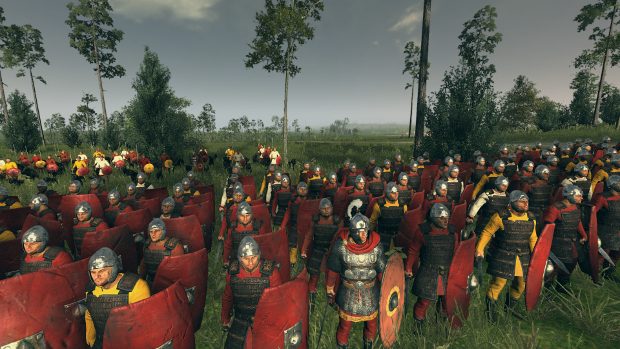
The campaign does so much right, takes so many steps to make Empire Divided seem like more than just another Rome 2 expansion, that it's jarring to switch to the mostly unchanged RTS battles. The huge leap the battles made between Rome 2 and Warhammer 2 wasn't just cosmetic, it was the diversity within and between the various faction rosters that had the most dramatic impact. It would have been hard for an expansion to really match that, but it doesn't feel like this is even trying.
In another universe, Creative Assembly released Empire Divided in 2014 and it was a huge improvement. Maybe even enough to make everyone forget about the fairly disastrous Rome 2 launch. Three years later, it just seems like it's playing catch up. If you're in desperate need of a historical strategy romp, you could do a lot worse than Empire Divided, and it's the best piece of Rome DLC by quite a large margin, but barely a turn went by without me wishing I was bullying Elves or fighting the hordes of Chaos instead.
Total War: Rome 2 - Empire Divided is out on November 30 on Steam for £10.79/$15.29/€15.79.
Source: https://www.rockpapershotgun.com/total-war-rome-2-empire-divided-review
0 Response to "Rome Total War 2 Empire Divided Too Easy"
Post a Comment